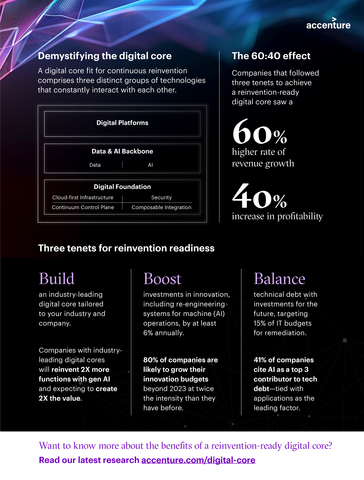New Research from Accenture Finds that Digital Core Investments Accelerate Reinvention and Innovation, Delivering up to 60% Higher Revenue Growth Rates and 40% Boost in Profit
Investments in digital core technology pave the way for businesses to thrive amid change and capture the value of generative AI

New research from Accenture finds that organizations with an advanced digital core, investments in strategic innovation and a balanced approach to their technical debt achieved
“Continuous reinvention is now the default strategy because of the pace of change. Organizations are trying to figure out how technology impacts their business operations, especially amid new advancements like generative AI," said Karthik Narain, group chief executive of Technology at Accenture. "Capturing value from disruptive technologies with an industry-leading digital core is more than a critical success factor, it’s a survival factor. A strong digital core is essential to be ready for reinvention and rapidly seize every new opportunity.”
For the report, “Reinventing with a Digital Core,” Accenture analyzed findings from 1,500 technology executives in 19 industries across 10 countries. Accenture’s research revealed that an advanced digital core is necessary to help enterprises build the technology capabilities needed to be ready for ongoing reinvention across the business. This requires using the right mix of cloud-first infrastructure and corresponding practices for agility and innovation, data and AI for differentiation, applications and platforms to accelerate growth, next-generation experiences and optimized operations—with security at every level.
Accenture’s research also identified AI as a top contributor to technical debt—the cost and effort required to keep IT systems up to date and capable of meeting business needs, accumulated through choices that prioritize speed over long-term maintainability.
Accenture's study outlines three fundamental tenets to achieve a digital core that’s reinvention ready. When these three tenets are adopted concurrently, businesses can experience considerable rewards, attaining up to
1. Build an advanced digital core, tailored to specific industry needs: Accenture’s research shows that companies need to achieve an "industry-leading" level of digital core capability to empower continuous reinvention. While the journey may seem complex, Accenture’s survey found that improving one capability—like data—can trigger automatic improvements in others. For this reason, companies should first assess where they are across their digital core capabilities, then prioritize “no-regret” moves based on areas of need. This will catalyze a virtuous cycle of continuous improvements across the digital core.
2. Boost investments in strategic innovation, including re-engineering systems for machine (AI) operations: Companies should monitor the rate at which they increase the proportion of their IT spend on innovation, as opposed to operations, as a key performance indicator. Accenture’s research found that a year-over-year increase of at least
3. Balance technical debt with investments for the future, using programmatic and autonomous methods: Accenture’s analysis shows that about
Explore the report in Accenture’s thought leadership app, Foresight, and get a personalized feed of recent latest insights, data, case studies, blogs and more. Download the app at http://www.accenture.com/foresight.
About the research
“Reinventing with a Digital Core” research is based on survey responses from 1,500 C-suite IT executives in 19 industries across 10 countries. We asked IT leaders about the state of their technology stack, their business landscape and financial and operational performance. We triangulated the quantitative findings of the survey with qualitative research, specifically through 20 in-depth interviews and 26 case studies.
About Accenture
Accenture is a leading global professional services company that helps the world’s leading businesses, governments and other organizations build their digital core, optimize their operations, accelerate revenue growth and enhance citizen services—creating tangible value at speed and scale. We are a talent- and innovation-led company with approximately 750,000 people serving clients in more than 120 countries. Technology is at the core of change today, and we are one of the world’s leaders in helping drive that change, with strong ecosystem relationships. We combine our strength in technology and leadership in cloud, data and AI with unmatched industry experience, functional expertise and global delivery capability. We are uniquely able to deliver tangible outcomes because of our broad range of services, solutions and assets across Strategy & Consulting, Technology, Operations, Industry X and Song. These capabilities, together with our culture of shared success and commitment to creating 360° value, enable us to help our clients reinvent and build trusted, lasting relationships. We measure our success by the 360° value we create for our clients, each other, our shareholders, partners and communities. Visit us at www.accenture.com.
Copyright © 2024 Accenture. All rights reserved. Accenture and its logo are registered trademarks of Accenture.
View source version on businesswire.com: https://www.businesswire.com/news/home/20240717721118/en/
Mylissa Tsai
Accenture
+1 617 488 7932
mylissa.tsai@accenture.com
Source: Accenture







